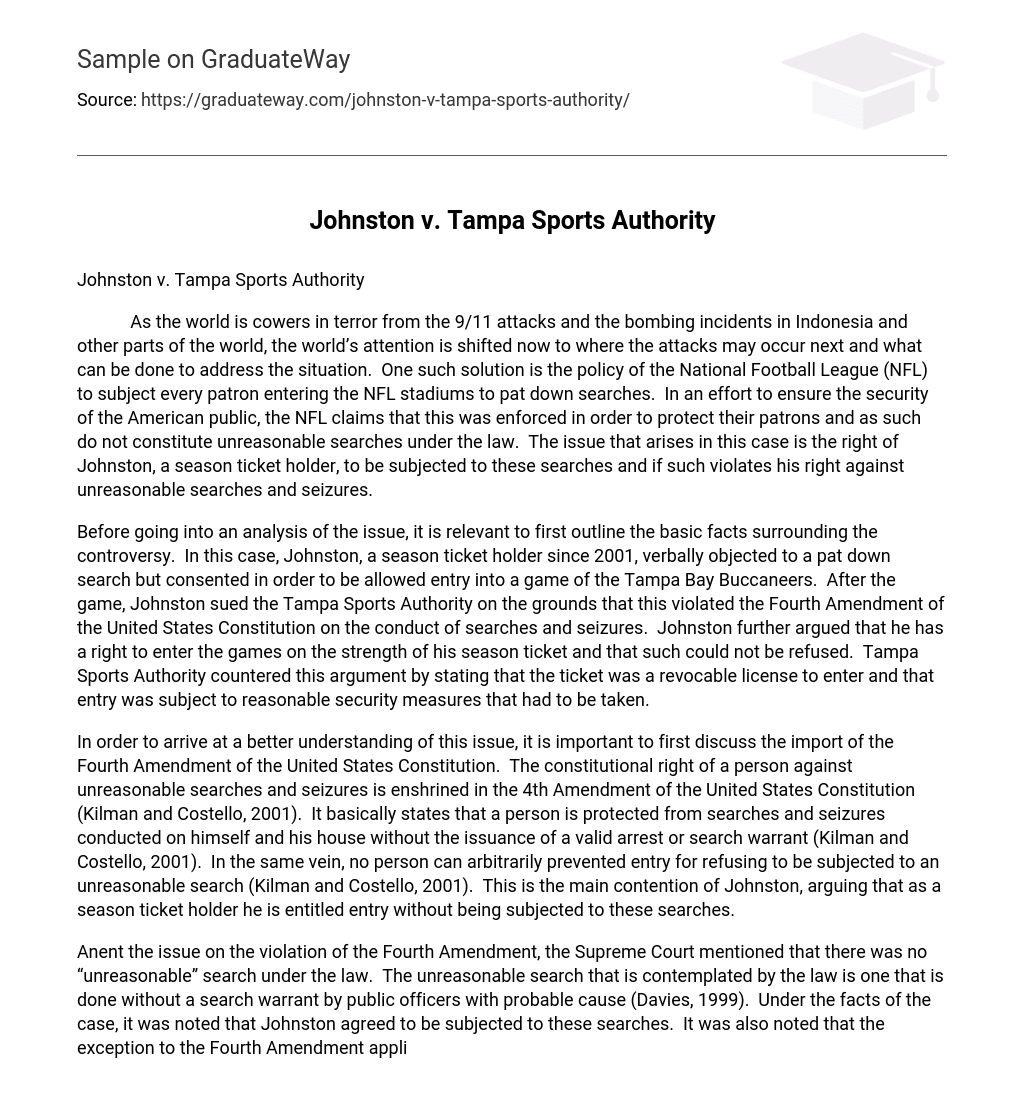As the world is cowers in terror from the 9/11 attacks and the bombing incidents in Indonesia and other parts of the world, the world’s attention is shifted now to where the attacks may occur next and what can be done to address the situation. One such solution is the policy of the National Football League (NFL) to subject every patron entering the NFL stadiums to pat down searches. In an effort to ensure the security of the American public, the NFL claims that this was enforced in order to protect their patrons and as such do not constitute unreasonable searches under the law. The issue that arises in this case is the right of Johnston, a season ticket holder, to be subjected to these searches and if such violates his right against unreasonable searches and seizures.
Before going into an analysis of the issue, it is relevant to first outline the basic facts surrounding the controversy. In this case, Johnston, a season ticket holder since 2001, verbally objected to a pat down search but consented in order to be allowed entry into a game of the Tampa Bay Buccaneers. After the game, Johnston sued the Tampa Sports Authority on the grounds that this violated the Fourth Amendment of the United States Constitution on the conduct of searches and seizures. Johnston further argued that he has a right to enter the games on the strength of his season ticket and that such could not be refused. Tampa Sports Authority countered this argument by stating that the ticket was a revocable license to enter and that entry was subject to reasonable security measures that had to be taken.
In order to arrive at a better understanding of this issue, it is important to first discuss the import of the Fourth Amendment of the United States Constitution. The constitutional right of a person against unreasonable searches and seizures is enshrined in the 4th Amendment of the United States Constitution (Kilman and Costello, 2001). It basically states that a person is protected from searches and seizures conducted on himself and his house without the issuance of a valid arrest or search warrant (Kilman and Costello, 2001). In the same vein, no person can arbitrarily prevented entry for refusing to be subjected to an unreasonable search (Kilman and Costello, 2001). This is the main contention of Johnston, arguing that as a season ticket holder he is entitled entry without being subjected to these searches.
Anent the issue on the violation of the Fourth Amendment, the Supreme Court mentioned that there was no “unreasonable” search under the law. The unreasonable search that is contemplated by the law is one that is done without a search warrant by public officers with probable cause (Davies, 1999). Under the facts of the case, it was noted that Johnston agreed to be subjected to these searches. It was also noted that the exception to the Fourth Amendment applies in this case because the search was with consent and Johnston voluntarily agreed to such searches. Under the circumstances, there was no violation of the Fourth Amendment.
Arguing further that there may have been a violation, it will be noted that Johnston was a season ticket holder since 2001. As early as then he was already aware of the conditions that were stated on the ticket, which signifies his agreement to be subject to the rules (Davies, 1999). While the ticket did allow entry to all the games, there were certain limitations that the Tampa Sports Authority imposed such as the requirement to abide by all security rules and regulations. It will also be noted that Johnston had not previously contested any of these rules before 2007. As such, it is clear from the foregoing that there was no violation of the rights of Johnston and that the injunction on the Tampa Bay Sports Authority was issued without basis and must be lifted.
References:
Kilman, Johnny and George Costello (Eds). (2000). The Constitution of the United States of America: Analyis and Interpretation
Thomas Y. Davies, Recovering the Original Fourth Amendment, 98 Mich. L. Rev. 547, 555 (1999)





